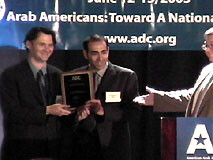The Electronic Intifada 19 June 2003

EI/eIraq’s Nigel Parry (L) and Ali Abunimah (C) accept the award from ADC Communications Director Hussein Ibish. (Ken Harper) Click here to watch the acceptance speeches. (EI)
The award was presented to EI and eIraq “in recognition of its commitment to bringing the concerns, voices, and experiences of the Iraqi and Palestinian peoples to audiences the world over via the Internet.”
What follows is the complete text of the acceptance speeches, which were shortened on the night.

EI/eIraq’s Ali Abunimah (EI)
We think of these websites as smart weapons. They’re the kind of smart weapons that don’t kill people. We hope that they are the sort of weapons that will make a small contribution towards freeing people in Iraq and in Palestine, and freeing people in the United States from the deceptions which were used to railroad this country into war and which are used to promote myths in which Palestinian violence is the only obstacle to peace, and the kind of deceptions which call a man who openly announced an assassination plan in the past days a “man of peace”. And all this for less than the price of a single laser guided bomb.
One final thing I want to say. Today, when I was at our booth downstairs, someone came up to me and said, “I really like what you’ve done with Electronic Iraq but I’m afraid that in the future, I’ll have to do the same for Syria.” I said “Don’t worry, we’ve already bought the domain name electronicSyria.net. We also own Electronic Yemen, Electronic Lebanon, Electronic Arabia, as well as Electronic Intifada.”
But it’s our job, all of us here, to make sure that these domain names are never ever used in the way we had to use Electronic Iraq. There is one domain name, though, that we bought that we hope to use in the near future: electronicPalestine.net.

EI/eIraq’s Nigel Parry (EI)
My “Personal Diary of the Israeli-Palestinian Conflict” photo diary chronicled the Ramallah redeployment. During the September 1996 Clashes, myself together with a group of Birzeit staff and students published “On the ground in Ramallah: Reports from a town become battlefield” — the first alternative news website published from within a war zone.
In 1999, Ali launched “Ali Abunimah’s Bitter Pill” to uncover media myths. The following years saw successful e-mail campaigns that forced Burger King and Kappa-Benneton to consider their ties with Israeli settlements that Arjan El Fassed worked hard on. And Laurie King-Irani’s work with the lawyers bringing the case against Ariel Sharon, Amos Yaron and other Israelis and Lebanese responsible for the Sabra and Shatila massacres has resulted in the opening of investigations leading to possible convictions in Belgium.
In 2000, when the Second Intifada broke out, we worked with Addameer to build the September 2000 Clashes website, which chronicled in great detail the first 60 days of the Intifada from a Palestinian perspective. And in 2001 we founded the Electronic Intifada, Palestine’s weapon of mass instruction, which offered the only reports from residents of Ramallah during Israel’s Orwellian-titled “Operation Defensive Shield”. In 2003 Electronic Iraq represented an alternative news moon shot, with daily reports from peace activists in Baghdad before, during, and after the “Shock and Awe” bombing campaign.
We’ve achieved a lot and have received many accolades. The Nation’s Alexander Cohen described us as “trusted”. The Financial Times called us “spectacular”. ITV’s “The Web Review” called us “a democratic bombshell” and gave us “10 out of 10”. Newsday credited us with “making the Palestinian cause more prominent” and even the Jerusalem Post dubbed us “the Palestinian CNN”.
These things aren’t enough. “Enough” is an important part of the equation here. For almost ten years now, we’ve been producing alternative news websites and they’ve had an impact. Electronic Iraq and Electronic Intifada — depending on how ‘hot’ the situation is on the ground — together receive between 300,000 and one million unique visitors a month. But these are shoestring operations. And my question to all of us here is: What would we actually be able to do if we actually had the resources?
We have a lot of power to tell the truth and to do so in a professional way. And that’s what we want to keep doing with your help. Thank you very much.
To help EI consolidate and improve its success, please support us financially and tell people about our work.